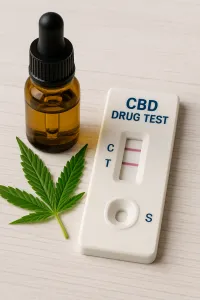Will CBD Cause You to Fail a Drug Test? What You Need to Know
As CBD (cannabidiol) becomes a go-to for stress relief, pain management, and overall wellness, many people worry about one key question: will CBD cause you to fail a drug test? With drug testing common in workplaces, sports, and other settings, it’s a valid concern. The short answer is that pure CBD is unlikely to trigger a positive drug test, but there are important nuances to understand. Let’s dive into how CBD interacts with drug tests, why certain products carry risks, and how to use CBD safely if you’re facing a test.

Will CBD Cause You to Fail a Drug Test? What You Need to Know
As CBD (cannabidiol) becomes a go-to for stress relief, pain management, and overall wellness, many people worry about one key question: will CBD cause you to fail a drug test? With drug testing common in workplaces, sports, and other settings, it’s a valid concern. The short answer is that pure CBD is unlikely to trigger a positive drug test, but there are important nuances to understand. Let’s dive into how CBD interacts with drug tests, why certain products carry risks, and how to use CBD safely if you’re facing a test.
How Drug Tests Work
Most standard drug tests, like urine or saliva tests, screen for THC (tetrahydrocannabinol), the psychoactive compound in cannabis that gets you high, and its metabolites (like THC-COOH). These tests typically don’t target CBD, which is non-psychoactive and doesn’t produce a high. However, the presence of even small amounts of THC in your system could lead to a positive result, depending on the test’s sensitivity and the type of CBD product you use.
Can CBD Cause a Failed Drug Test?
Pure CBD, such as that found in CBD isolates or broad-spectrum products, contains no THC and is highly unlikely to cause a failed drug test. However, certain factors related to CBD products and usage can increase the risk of testing positive for THC:
Full-Spectrum CBD Products:
These contain trace amounts of THC (legally up to 0.3% in hemp-derived products). While this amount is too low to get you high, frequent or high-dose use can lead to THC buildup in your body, potentially detectable by sensitive drug tests.
Mislabeling or Poor-Quality Products:
Some CBD products, especially from unregulated or less reputable brands, may contain higher THC levels than advertised. This can inadvertently lead to a positive test result.
Cross-Contamination:
In rare cases, manufacturing processes may introduce small amounts of THC into products labeled as THC-free, posing a risk.
Test Sensitivity:
Some drug tests are highly sensitive and can detect even minute levels of THC metabolites, which can linger in the body for weeks after last use.
Factors That Affect the Risk
Several variables influence whether CBD use could lead to a failed drug test:
Type of CBD Product:
Full-spectrum CBD carries a small risk due to trace THC, while broad-spectrum and CBD isolate products are THC-free and safer for drug-tested individuals.
Dosage and Frequency:
Taking large doses or using full-spectrum CBD daily can increase THC accumulation, raising the chance of a positive result.
Individual Metabolism:
People metabolize THC at different rates based on factors like body fat, genetics, and liver function. Someone with a slower metabolism might retain THC metabolites longer.
Timing of Use:
THC and its metabolites can stay in the body for 2-4 weeks (or longer for heavy users), so recent use of a THC-containing CBD product could be problematic.
Type of Drug Test:
Urine tests are the most common and detect THC metabolites for weeks. Saliva and blood tests have shorter detection windows but may still pick up trace THC.
How to Use CBD Safely to Avoid Failing a Drug Test
If you’re concerned about drug testing but want to use CBD, follow these practical tips to minimize risks:
Choose THC-Free Products:
Opt for broad-spectrum CBD or CBD isolates, which contain no THC. Always check third-party lab reports (Certificates of Analysis) to confirm the product is free of THC.
Buy from Reputable Brands:
Purchase CBD from trusted companies that provide transparent, up-to-date lab testing to verify THC content and product purity.
Start with Low Doses:
Begin with a small dose (5-10 mg) and avoid frequent use of full-spectrum products to reduce the chance of THC buildup.
Pause Use Before Testing:
If you know a drug test is coming, stop using CBD products, especially full-spectrum ones, at least 2-4 weeks in advance to allow any trace THC to clear your system.
Disclose Medical Use:
If you use CBD for medical reasons, inform your employer or testing agency. Some may allow exceptions with proper documentation, such as a doctor’s note.
Understand Your Test’s Sensitivity:
Ask about the type of drug test and its cutoff levels for THC. Standard tests often have a cutoff of 50 ng/mL for THC metabolites, but more sensitive tests may detect lower levels.
What to Do If You’re Worried About a Test
If you’ve been using full-spectrum CBD and are facing a drug test, consider these steps:
Stop Using Immediately:
Cease CBD use as soon as possible to give your body time to eliminate any THC metabolites.
Hydrate and Exercise:
Drinking water and staying active may help your body clear THC faster, though this isn’t guaranteed.
Consult a Professional:
If you’re unsure about your risk, talk to a healthcare provider or cannabis specialist for guidance tailored to your situation.
Final Thoughts
Pure CBD is unlikely to cause a failed drug test, but full-spectrum CBD products with trace THC can pose a risk, especially with frequent use or sensitive tests. By choosing THC-free products, buying from reputable brands, and pausing use before a test, you can enjoy CBD’s benefits while minimizing the chance of a positive result. Always verify product contents with lab reports and use CBD responsibly to stay on the safe side.
